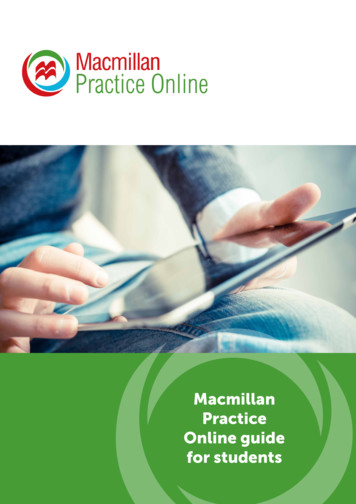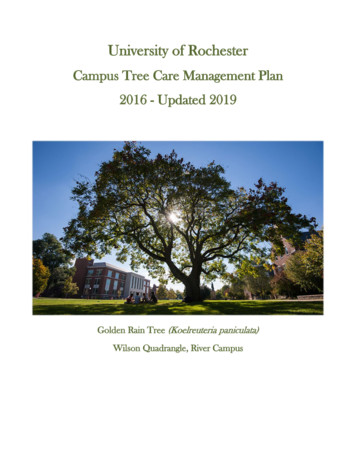MACMILLAN LIFE SKILLS
MACMILLANLIFE SKILLSExpressing yourself: ways of agreeing and disagreeingTotal time for activities: 45 minutesExpressingyourselfLevel: upper intermediate to advanced1.Before class, make copies of the worksheets and cut up Worksheets B, C and D so that you have five individual worksheetsfor each learner.2.Display these two short dialogues and ask learners to comment on the difference between them:Teacher’s NotesOverview: In this lesson, learners review, consolidate and practise expressions for agreeingand disagreeing.‘Computers will soon make teachers redundant.’‘I’m afraid I can’t agree with you. No computer can give the same kind of help and support as a teacher.’‘Computers will soon make teachers redundant.’‘Rubbish. No computer can give the same kind of help and support as a teacher.’They should recognize that ‘I’m afraid I can’t agree with you’ is quite formal and respectful, whereas ‘rubbish’ is informal andpotentially quite insulting. However:a. ‘rubbish’ can be a perfectly acceptable way of disagreeing in a friendly conversation among people who know each other well,b. the choice of words is not the only thing that matters; the effect of both ways of disagreeing depends to a large extent onthe speaker’s tone of voice and facial expression,c.people usually try to justify their agreement or disagreement by adding an explanation or example – in this case: ‘No computercan give the same kind of help and support as a teacher.’Explain that this lesson will be about ways of agreeing and disagreeing.3.Distribute Worksheet A. Learners work on the task in pairs. Point out that there is more than one correct answer for questions3 and 4.4.Elicit and confirm answers.Answersc (This is too formal for the situation.)2b3a and d4b and c5b (But note that the effect of ‘I’m sorry’ depends on tone of voice and facial expression; it could sound quite threatening.)6a (Sometimes ‘I don’t know’ actually means ‘I disagree’!)7b8cOTHNwww.macmillandictionary.com P Macmillan Publishers Limited, 2014.OFR BE CO DO OM W PW N IAEB LO BSI A LTE DE ED Distribute Worksheet B. This checks knowledge of the form of some expressions of agreement and disagreement. Learnerswork on the task individually and check in pairs. Note that, apart from the expression ‘You must be joking’, all of the expressionsappear on Worksheet A. You could ask learners to put Worksheet A aside while they fill in Worksheet B and then use Worksheet Ato check their answers.CAexpressing yourself5.1
MACMILLANLIFE SKILLSExpressing yourself: ways of agreeing and disagreeingElicit and confirm answers.Answers1You can say that again.8You’ve got a point there, but .2You’re telling me.9Speak for yourself.3I couldn’t agree more.10 Don’t make me laugh.4I’m inclined to agree.11 Are you kidding? (also possible: joking or serious)5I agree up to a point, but .12 You must be joking. (also possible: kidding)6I wouldn’t go as far as to say that.13 Nothing of the kind!7I take your point, but .(also possible: see or get)7.Distribute Worksheet C. Learners work on the task individually and check in pairs.8.Elicit and confirm answers. Drill if necessary.Teacher’s Notes6.Answers9.1You can say that again.7Speak for yourself.2You’re telling me.8Are you kidding?3I couldn’t agree more.94I’m inclined to agree.You must be joking. / You must be joking. /You must be joking.5I agree up to a point, but .6I wouldn’t go as far as to say that.10 Nothing of the kind!11 How can you say that?Distribute Worksheet D. Allow time for learners to peruse it and to mark any expressions which are relatively unfamiliar tothem, or which they tend to make mistakes with. Note that phrases like ‘It isn’t’, ‘It shouldn’t’, ‘They didn’t’ etc are used whenagreeing with negative statements. The same phrases can also be used to disagree with positive statements.10. Distribute Worksheet E and divide learners into groups of three. Learner A calls out the number of one of the statementson Worksheet E – it could be a random number, or one which they think will be particularly interesting. Learner B readsout the statement to Learner C. Learner C responds by agreeing or disagreeing and adding some justification for theiragreement or disagreement. The procedure is repeated ten times. Learner C should try to use a range of expressions,including those they are less familiar with; they can refer to Worksheet D if necessary. After ten rounds, Learner A givesfeedback to Learner C: Did they respond accurately and appropriately? Did they use a range of expressions? Did theyjustify their agreement or disagreement?Follow-upThe activity described in step 10 can be repeated for a few minutes in subsequent lessons, perhaps with the following adjustments: Learners can provide their own lists of statements for agreement or disagreement. Learners can reduce Worksheet E to individual shortlists of expressions they feel they particularly need to practise. Any of the topics mentioned in Worksheet E could be developed into a longer discussion, with time given for learners toprepare points for or against.Hwww.macmillandictionary.com P Macmillan Publishers Limited, 2014.CA ON TOFR BE CO DO OM W PW N IAEB LO BSI A LTE DE ED expressing yourselfLearners then swap roles and repeat the activity twice, so that everyone has a turn as A, B and C. They should feel free toimprovise with the statements on Worksheet E, and/or add new ones.
MACMILLANLIFE SKILLSExpressing yourself: ways of agreeing and disagreeingStudent’s CopyWorksheet AAgreeing and disagreeing: Select the correct answers.5.The traffic in town’s worse than ever today.The 1960s were the best decade for music.aYou’re telling me. It took me ages to get home from work.aRubbish! Have you listened to any music since then?bYou can say that again. It took me ages to get homefrom work.bI’m sorry, but have you listened to any music since then?ccI agree entirely. It took me ages to get home from work.How can you say that? Have you listened to anymusic since then?dIt certainly is. It took me ages to get home from work.dAre you kidding? Have you listened to any musicsince then?Which of these responses expresses tentativeagreement?6.I think it’d be better to postpone the meeting till next week.aExactly. Too many people are away this week.bI’m inclined to agree. Too many people are awaythis week.cdWhat use is history? Do you remember our history lessonsat school? Most of what they taught us was completelyuseless, wasn’t it?aI don’t know. I don’t think it’s fair to say that, actually.I couldn’t agree more. Too many people are awaythis week.bI take your point, but that was probably because ofthe way it was taught.It would. Too many people are away this week.cYou’ve got a point there, but the problem was that theteachers didn’t really show how it was relevant to us.dThat’s true, but I think it’s taught a bit differentlynowadays.Which of these responses express reluctantagreement? (There is more than one correct answer.)bYou’re right. Let’s just phone them instead, shall we?cI know. Let’s just phone them instead, shall we?dI guess so. Let’s just phone them instead, shall we?7.I think we all agree that the writing was the hardest partof the test.expressing yourselfWhich of these responses express partialagreement? (There is more than one correct answer.)Listening to English is really impossible.aAbsolutely, but speaking it’s even worse!bI agree up to a point, but it gets easier with practice.cI wouldn’t go as far as to say that. It’s difficult, but it’sreally just a matter of getting used to it.dThat’s right – so many of the words are unclear. Macmillan Publishers Limited, 2014.Which of these responses is the most polite?8.aSpeak for yourself.bExcuse me, but I’m not sure whether everyonethought so.cWe all agree? You must be joking!dNonsense! The listening was far worse.Which of these responses is the most polite?All public transport in cities should be free.aDon’t make me laugh. How on earth would it befinanced?bNothing of the kind! How on earth would it be financed?cI’m afraid I can’t agree with you. How on earth wouldit be financed?dOf course not. How on earth would it be financed?www.macmillandictionary.comOTI suppose so. Let’s just phone them instead, shall we?OFR BE CO DO OM W PW N IAEB LO BSI A LTE DE ED aHIt’s getting late. I think we’d better go home, without callinground to see your parents.4.Which of these responses expresses disagreementmost strongly?N3.Which of these responses gives an impressionof politeness? P2.Which of these ways of agreeing is leastappropriate here?CA1.
MACMILLANLIFE SKILLSExpressing yourself: ways of agreeing and disagreeingStudent’s CopyWorksheet BComplete these expressions of agreement and disagreement.1.You can say that .8.You’ve got a there, but .2.You’re me.9.for yourself.3.I agree more.10. Don’t make me .4.I’m to agree.11. Are you ?5.I agree to a point, but .12. You must be .6.I go as far as to say that.13. of the kind!7.I your point, but . Worksheet CWhere are the main stresses in these expressions of agreement and disagreement?1.You can say that again.7.Speak for yourself.2.You’re telling me.8.Are you kidding?3.I couldn’t agree more.9.You must be joking.4.I’m inclined to agree.10. Nothing of the kind!5.I agree up to a point, but .11. How can you say that?6.I wouldn’t go as far as to say that. Worksheet DWays of agreeing and disagreeing:Agreeing tentatively or reluctantlyDisagreeingThat’s right.I suppose so.I’m afraid I can’t agree with you.You’re right.I guess so.I’m sorry, but .I know.I’m inclined to agree.Excuse me, but .Exactly.Of course not.Absolutely.Agreeing partiallyI disagree.You can say that again.I agree up to a point, butI don’t know.You’re telling me.I wouldn’t go as far as to say that.Speak for yourself.I agree (entirely / absolutely).I take your point, but .Don’t make me laugh.I couldn’t agree more.You’ve got a point there, but .Are you kidding?(Yes.) It is / It should / They did etc.That’s true, but .You must be joking.Nothing of the kind!Rubbish!How can you say that?OFR BE CO DO OM W PW N IAEB LO BSI A LTE DE ED Nonsense!HNwww.macmillandictionary.com P Macmillan Publishers Limited, 2014.OT(No.) It isn’t / It shouldn’t / They didn’t etc.CAexpressing yourselfAgreeing
MACMILLANLIFE SKILLSExpressing yourself: ways of agreeing and disagreeingStudent’s CopyWorksheet EStatements to practise agreeing and disagreeing:1.People spend far too much time shopping – shops should be closed in the evenings and at weekends.2.English is a very polite language.3.All motor vehicles should be excluded from city centres – this would result in a vast improvement in people’s quality of life.4.Literature is without doubt a higher form of art than cinema.5.It’s absolutely scandalous that people like film stars and rock musicians earn such high salaries.6.In the future, everybody will speak English, and all other languages will eventually die out.7.A miner and a doctor should earn the same salary.8.The mobile phone is one of the best inventions ever.9.Everybody should have the freedom to work flexitime – to start and finish work when it suits them.10. All medical treatment should be free.11. Music is more important than economics.12. When a text is translated, something is always lost.13. Dolphins are more intelligent than human beings.14. If I had the opportunity to make one journey to the past, I’d go back to the period when dinosaurs roamed the earth.15. I think it’s important to support small shops, instead of doing your shopping in supermarkets and big stores.16. There must be life on other planets.17. It’s a waste of time learning Latin nowadays.18. Separating and recycling of rubbish is more trouble than it’s worth.19. If you aren’t sufficiently gifted, you’ll never be a good language learner.20. Walking is the best way to travel.21. Basic medical training should be a part of every school curriculum.22. Shopping’s boring.23. I think air travel should be subject to hefty surcharges to compensate for carbon dioxide emissions from aircraft.25. Everyone knows that climate change is man-made.26. Fossil fuels are responsible for far more deaths than nuclear power.27. Modern technology means that people are losing the ability to read and write properly.28. I think everyone would agree that English spelling is illogical.29. The younger you are when you start learning a language, the better you’ll be able to speak it.30. Human beings will never colonize other planets.31. Passengers on trains and buses should have to wear seatbelts.32. So-called ‘special offers’ in shops are always a con.33. Colonialism is always wrong, and always has been.HNwww.macmillandictionary.com P Macmillan Publishers Limited, 2014.OT35. Space exploration is a complete waste of money – it will never yield any practical benefits, and there are far more urgentneeds here on earth.OFR BE CO DO OM W PW N IAEB LO BSI A LTE DE ED 34. All governments should have an equal number of male and female ministers.CAexpressing yourself24. Having different retirement ages for men and women is grossly unfair – countries that have different retirement ages shouldbe forced to make them the same.
OT OCOABLE CAN BE DOWNLOADE D FROM WEBSIT E expressing yourself Macmillan Publishers Limited, 2014. www.macmillandictionary.com MACMILLAN LIFE SKILLS Student’s .
Rocket Science, in partnership with Consilium Research and Consultancy, was commissioned in early 2016 to evaluate Phase 2 of Macmillan @ Glasgow Libraries. Macmillan @ Glasgow Libraries is a tiered model of Macmillan Cancer Information and Support Services, which a
Palgrave Macmillan in the UK is an imprint of Macmillan Publishers Limited, ls,Basingstoke, Hampshire RG21 6XS. Palgrave Macmillan in the US is a division of St Martin's Press LLC, 175 Fifth Avenue, New York, NY 10010. Palgrave Macmillan is the global academic imprint of the above companies
Your Macmillan Practice Online course Joining a class Opening resources Completing a resource Submitting answers Viewing your scores Sending and receiving messages My Profile Using Macmillan English Dictionary online Macmillan Practice Online guide for students Macmillan Practice Online is an online practice environment for learners of English.
Macmillan is based in the United States. Our representative in the EEA is: Macmillan Publishers International Limited Company number: 02063302 . Pan Macmillan T. he Smithson 6 Briset Street . London, EC1M 5NR. Att: Legal Department . Contact Point for inquiries: Helaine Ohl, VP Global HR Director, Macmillan, 120 Broadway, 22nd Floor, New York, New
MACMILLAN MODERN DRAMATISTS J . . Synge Bugene Benson Professor of English, College of Arts University of Guelph, Ontario Macmillan Macmillan Education . THE MACMILLAN PRESS LTD London and Basingstoke Companies and representatives throughout the world ISBN 978--333-28922-8 ISBN 978-1-349-16915-3 (eBook)
Little Women Retold by Anne Collins CLASSICS MACMILLAN _pqg. Macmillan Education The Macmillan Building 4 Crinan Street London N1 9XW A division of Macmillan Publishers Limited Companies and representatives throughout the world ISBN 978--230-03500-3 ISBN 978-1-4050-7620-3 (with CD edition)
Macmillan Practice Online guide for teachers Macmillan Practice Online is an online practice environment for learners of English. Students login to complete activities from an online course that can match the syllabus of a Macmillan book, offer preparation for a specific exam or practice for general and business English.
ANSI A300 (Part 6)-2005 Transplanting, ANSI Z60.1- 2004 critical root zone: The minimum volume of roots necessary for maintenance of tree health and stability. ANSI A300 (Part 5)-2005 Management . development impacts: Site development and building construction related actions that damage trees directly, such as severing roots and branches or indirectly, such as soil compaction. ANSI A300 (Part .





















